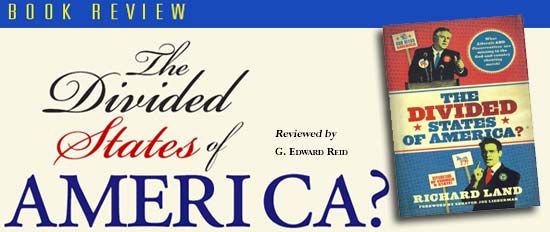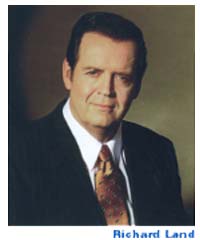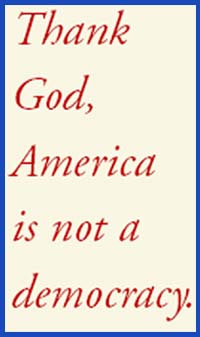The Divided States of America?
G. Edward Reid September/October 2007
Getting your Trinity Audio player ready...

Richard Land's The Divided States of America? (published in Nashville, Tennessee, by Thomas Nelson, Inc., 2007) has as its subtitle: What Liberals AND Conservatives Are Missing in the God-and-Country Shouting Match! It is a thought-provoking book that analyzes both groups of shouters. Albeit he does seem to come down a little harder on the secular fundamentalists, as he calls them, than the religious fundamentalists.).

Dr. Land has been president of the Southern Baptist Convention's Ethics and Religious Liberty Commission for some time. His education is Ivy League, with a bachelor's degree from Princeton and a doctorate from Oxford. Accordingly, he has written his book from considerable personal knowledge of the current American scene and from the perspective of having read or scanned many works on American history—from the civil as well as the religious perspective.
Land states: "This is a clear picture of the religious divide in this country: on the one side, those who are committed to a transcendent moral authority; on the other, those whose moral authority is defined by rationalism and subjectivism" (p. 10).
Several places in his book Land speaks about the special blessing of God on America. This makes America an exceptional nation. "American exceptionalism," he writes, "is not based on ethnicity, race, or religion. It is a doctrine of obligation, responsibility, sacrifice, and service" (p. 31).
Dr. Land posits: "While it is true that America was not founded as a Christian nation, it was certainly founded by people who were operating out of a Judeo-Christian worldview, and the American government put in place by the Constitution was an attempt to wed Judeo-Christian values with Enlightenment ideas of self-government" (p. 32).
The book states very clearly that the institutions of the state and the church should be kept separate and that neither should try to control the other. However, he takes the position that the "morals" of the majority should find their place in legislation. For example, "People aren't forced to read 'In God We Trust' on their currency to get paid or spend their money. If the majority of the American people decide they don't want that phrase on their currency anymore, or if the majority decide that they want to take 'under God' out of the pledge, all they have to do is pass legislation to repeal it" (p. 131).
Several places in the book Dr. Land mentions that a significant majority of Americans say religion is a very important part of their lives. He notes that the prevalence of religious belief seems to be increasing rather than decreasing. "God matters to the vast majority of Americans" (p. 34). With this statement in mind, it is very significant how he views the role of this majority. To Land, while the religion of an individual should not enter into the civil area, the moral values that are based on a person's religion should be expressed there. "In the United States, 84 percent of Americans say that religion is very important in their lives. If we say that religiously informed moral values should not be part of the equation, then we are condemning ourselves to decisions made by a minority of the population for whom religion is not important" (p. 174A Slippery Slope
In an inconsistent flavor to the rest of the book, Land states that America is a democracy and should establish moral values consistent with the majority of its citizens (p. 149). In discussing the civil rights movement Dr. Land states: "But this [America] is a democracy, so the white supremacists had the right and the opportunity to make their argument. We didn't deny them their First Amendment right to freedom of speech and freedom of expression. They simply lost the argument. They were outvoted. A majority of the American people said, 'You're wrong'" (p. 174).

The author goes on to say, "Some renegade Mormons may advocate polygamy, but they are not allowed legally to practice it – unless they can convince a majority of Americans they're right, in which case the laws would then be changed" (p. 175).
Dr. Land uses this concept of legislating the moral values of the majority (p. 141) in several more places. For example, "To those who are advocating homosexual marriage, I say, if you think there ought to be same-sex marriage in the United States, then go out and convince a majority of the American people that is what should be done" (p. 160). "The winning team is the one that can put the most able-bodied players on the field with the best game plan for victory. Moral values can carry an election because they are important to the majority of the American people" (p. 162).
Dr. Land concludes, "When religion makes a difference in people's lives, they have a right to bring their religious convictions to bear on public policy. This is called 'the democratic process.' And when they convince a majority of Americans they are right, they have a right to a government that reflects those moral values" (p. 178).
The author cites several more similar examples; each time advocating the right of the majority to make the laws that affect everyone. The concern I have for this position is that, thank God, America is not a democracy. If it were, the rights of the minority to their own religious moral values would not be honored and could, in fact, be legislated against! The fact is, America is a constitutional republic. Its citizens are not governed by the majority of the people but by the rule of law. Constitutional Republics are a deliberate attempt to diminish the threat of mobocracy, thereby protecting dissenting individuals and minority groups from the tyranny of the majority by placing checks on the power of the majority of the population. The power of the majority of the people is checked in electing representatives who govern within the limits of overarching constitutional law, rather than the popular vote having legislative power itself.
I would recommend the book to those who are interested in religious liberty—with the caveat to watch out for the slippery slope of majority rule—even if it is motivated by moral values.
G. Edward Reid, Esq., writes from Highland, Maryland.